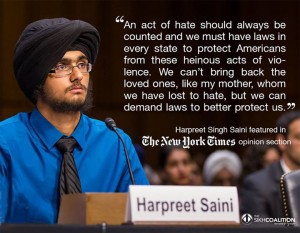According to the New York Time's an article
'There Ought to Be a Law Against Hate'
By HARPREET SINGH SAINI
was published on the opinion page according to which The USA has given us a perfect example by initiating strict action against the one committing hate crimes. Read more about the article in detail below. All countries should introduce similar laws.
------------------------------===============------------------=-=-=-=-
OAK CREEK, Wis. — LAST week, the Department of Justice indicted Dylann Roof, the suspect in the shooting deaths of nine people in Charleston, S.C., for hate crimes. Officials said they were bringing this indictment because they were worried that the racial motivation in the case would not be addressed adequately by a trial in a state court.
The reason for this concern is that South Carolina is one of five states (the others are Arkansas, Georgia, Indiana and Wyoming) that, according to the Anti-defamation league, have no laws enhancing penalties for bias-motivated crimes. The national profile of the massacre in Charleston has stirred this action, but as a rule federal hate crime prosecutions are rare.
Since federal hate crime legislation passed in 2009, the government has obtained only 29 convictions. Compare this with New York, where in 2013 alone (the most recent year for which data is available), state prosecutors reporters 149 hate crime convictions.
Handling hate crimes at the local level allows states to better document, analyze and prevent hate crimes in their jurisdiction. The A.D.L. cites studies demonstrating that “victims are more likely to report a hate crime if they know a special reporting system is in place.”
The logic is simple. If I see a crime, I am more likely to call my neighborhood police department than try to contact an F.B.I. field office.
Like most Americans, I rarely interact with federal law enforcement. If I fear my Sikh community is under threat, I look to state and local agencies for protection.
This is not a hypothetical situation. Three years ago next month, a white supremacist walked into the Oak Creek gurdwara, a Sikh temple, and fatally shot my mother, Paramjit Kaur Saini, and five other worshipers.
I was 18 and just about to start college. My mother never got to see me off.
After her death, I determined to make sure that her status as a victim of a hate crime would not go unrecorded. I had no experience in public speaking — at school, I had hardly ever raised my hand — but six weeks after the Oak Creek massacre, I summoned all my courage and went to testify before a Senate hearing on hate crimes and domestic violent extremism.
Although my home state has a hate crime law, the federal government, I discovered from investigators in the aftermath of the Oak Creek shootings, did not record hate crimes against the Sikh community. At the hearing, I argued that my mother should have the dignity of her death recorded accurately for what it was.
Eight months later, in 2013, the F.B.I. agreed to change its policy, and it now tracks hate crimes against Sikhs, as well as Hindus and Arabs, as it does for other communities that can be targets of bias-motivated violence.
Wade Micheal page, the neo-Nazi who killed my mother, died at the scene of his crime by a self-inflicted gunshot wound, after being hit by police gunfire outside the gurdwara. Because of the massacre’s notoriety — the attorney general at the time, Eric H. Holder Jr., described the killings as “an act of terrorism, an act of hatred, a hate crime” — a federal prosecution might have followed if Mr. Page had survived to stand trial.
Even without that intervention, though, he would have faced the more severe penalties attached to hate crime charges in a Wisconsin court. That matters because state hate crime laws represent the local public commitment to protecting communities that may be targeted for their race, religion or ethnicity.
Since the June 17 shootings in Charleston, at least eight predominantly African-American churches in the South have burned down — incidents that demand hate crime investigations. Many suspect that these fires were set deliberately in attacks designed to terrorize the African-American community.
Without a hate crime law, however, South Carolina would probably file only arson charges against any culprits. In addition, there is a clear reluctance on the part of law enforcement and local authorities to label these church burnings suspected hate crimes.
Research by the Southern Poverty Law Center has found that South Carolina alone is home to six neo-Confederate groups, four white nationalist organizations, two factions of the Ku Klux Klan and three neo-Nazi groups. It is only a matter of time before a deranged individual or group influenced by their creed of hate strikes again.
Wendell G. Gilliard, who is the state representative for the district where the Emanuel African Methodist Episcopal Church stands, is a co-sponsor of a hate crimes bill introduced in the last session of the South Carolina Legislature. He has vowed to redouble efforts to pass the law.
This is an opportunity for South Carolina to lead, and the other four states to follow, in enacting laws that could help to deter another tragedy like the ones in Oak Creek and Charleston. An act of hate should always be counted and we must have laws in every state to protect Americans from these heinous acts of violence.
We can’t bring back the loved ones, like my mother, whom we have lost to hate. But we can demand laws to better protect us.


